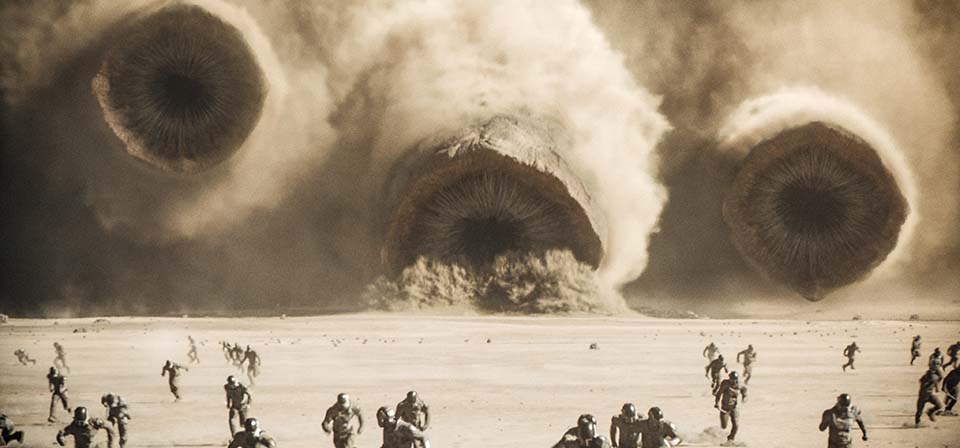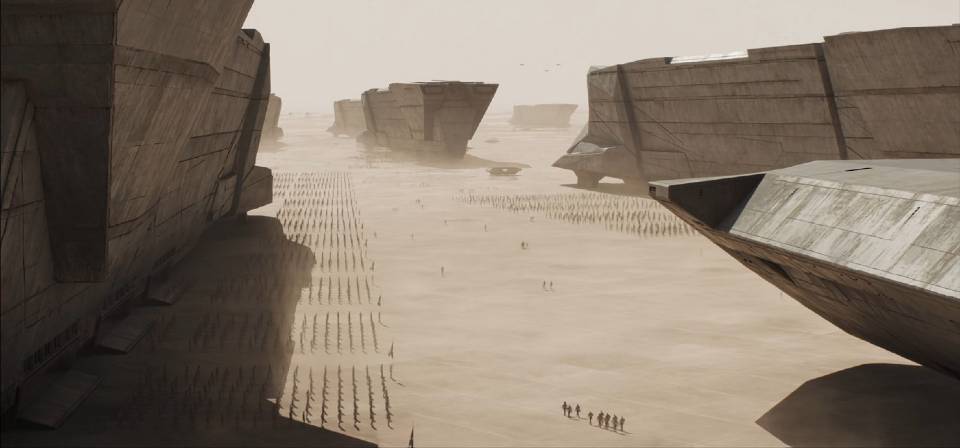Dune and The Lord of the Rings
Worldbuilding in the mythic past and the remote future in two of the 20th century’s most influential literary sagas
Coming to Denis Villeneuve’s Dune films as I do with essentially no prior background with Frank Herbert’s books, two obvious points of entry for me into the general milieu of Dune are Star Wars and The Lord of the Rings. In my reviews of Dune: Part One and now Dune: Part Two (filed and pending publication; stay tuned!) I’ve written a bit comparing and contrasting Dune with Star Wars. Here I’d like to consider Dune in relation to The Lord of the Rings and J.R.R. Tolkien’s larger legendarium.
In many ways Dune and The Lord of the Rings are comparable works; indeed, they stand alone among 20th-century literary projects in their depth and scope of worldbuilding, with dense, rich lore developed over multiple volumes finished and unfinished—in both cases in some way posthumously developed by the author’s sons. Tolkien may have left behind far more in the way of unfinished writings, and Christopher Tolkien may have managed his father’s literary legacy with more grace than Brian Herbert. Yet the parallels, however inexact, are striking and unique. Arthur C. Clarke reasonably remarked, “I know nothing comparable to [Dune] except Lord of the Rings.”
Even Tolkien acknowledged the kinship of the works—in a 1966 letter expressing his strong dislike for Dune:
It is impossible for an author still writing to be fair to another author working along the same lines. At least I find it so. In fact I dislike Dune with some intensity, and in that unfortunate case it is much the best and fairest to another author to keep silent and refuse to comment.
It might seem strange that Tolkien saw himself and Herbert as “working along the same lines,” especially given the popular idea of Tolkien as a medievalist curmudgeon who hated modernity, for whom science fiction would presumably be anathema. In reality, Tolkien considered science fiction “a very good medium for the imagination to work with”—and he saw science fiction and fantasy as more related than opposed:
The relationship between science fiction and fantasy is difficult and topically important.… Obviously many readers of [science fiction] are attracted to it because it performs the same operation as fantasy — it provides Recovery and Escape (I analyzed these in my ‘Essay on Fairy Stories’) — and wonder. But when they invoke the word ‘Science,’ and use an element of scientific knowledge (very variable, sometimes, in scope and accuracy) authors nowadays are more easily able to produce suspension of disbelief. The legendary laboratory ‘professor’ has replaced the wizard. [Emphasis added —SDG]
The caricature of Tolkien as a cranky Luddite standing athwart technological and literary history yelling Stop has received some salutary pushback in recent years, most notably from Holly Ordway in her 2021 book Tolkien’s Modern Reading: Middle-earth Beyond the Middle Ages. Middle-earth is set in the mythic past, but Ordway establishes that Tolkien’s legendarium is informed by his reading of a wide range of modern works—and that Tolkien’s literary tastes were certainly catholic enough to include works of science fiction. Tolkien had a high regard, for example, for H.G. Wells and Isaac Asimov, and he was “enthralled” by the first (and most “science-fictiony”) volume in his friend C.S. Lewis’s so-called Space Trilogy, Out of the Silent Planet.
Tolkien’s dislike for Dune interests me partly because, while I’m fascinated by Villeneuve’s adaptations, reviewing them has proven a challenge, since I must try to articulate my appreciation of movies the appeal of which I struggle to explain to myself. Certainly when I read my own descriptions in my reviews, they sound to me like movies I would dislike! Yet I do like them. I suspect, though, that I wouldn’t enjoy Herbert’s books—and the excerpts of Dune that I have read do nothing to challenge that impression.
It would be easy to assume that, as a devout Catholic, Tolkien was put off to Dune’s antireligious themes, particularly its deconstruction of messianic hope. Certainly this wouldn’t have endeared Dune to him. Yet Tolkien could enjoy world-building works with philosophical underpinnings at odds with his faith, such as those of H.G. Wells. The author that Tolkien praised as “the greatest and most convincing writer of ‘invented worlds’ I have ever met,” E.R. Eddison, he also censured in the same breath as “corrupted by an evil and indeed silly ‘philosophy’” and “coming to admire, more and more, arrogance and cruelty.”
It might also be thought that Herbert’s limitations as a literary stylist were off-putting to the Merton Professor of English Language and Literature. Again, Herbert’s straightforward, journalistic prose wouldn’t have been a selling point, but Tolkien was more than capable of appreciating well-constructed fictional worlds mediated through undistinguished writing—as evidenced, for example, by his enthusiasm for H. Rider Haggard. I do wonder whether Tolkien, as a philologist and polyglot who spoke or read any number of languages, and certainly who took very seriously the business of constructing the linguistic side of his cultural worlds, might have been less forgiving of Herbert’s linguistic dabblings, such as his corrupted Arabic!
I wonder whether a clue to Tolkien’s negative reaction to Dune, or at least to a part of it, might lie in his friend C.S. Lewis’s dislike for Alexandre Dumas’s The Three Musketeers. In his essay “On Stories,” Lewis wrote:
If to love Story is to love excitement then I ought to be the greatest lover of excitement alive. But the fact is that what is said to be the most ‘exciting’ novel in the world, The Three Musketeers, makes no appeal to me at all. The total lack of atmosphere repels me. There is no country in the book—save as a storehouse of inns and ambushes. There is no weather. When they cross to London there is no feeling that London differs from Paris.
The Lord of the Rings, which of course Lewis adored, overflows with what he calls atmosphere: page after page describing the various features of the regions through which the companions pass, from the landscape and vegetation to the types of dwellings typical to each locale to a constant awareness not only of the weather, but of atmospheric conditions as reflections of the struggle between good and evil. Many readers are indeed put off by just how much “atmosphere” Tolkien infuses into his story!
Clearly Tolkien loves what Lewis loves; if, like Lewis, he is also alienated by its absence, it’s easy to see how what repelled Lewis in Dumas might have repelled Tolkien in Herbert. Herbert’s writing is terse and propulsive, driven by dialogue and exposition, with minimal description and little interest in the physical qualities of the world around the characters. The first several short chapters or scenes take place entirely indoors, and although we visit three planets there’s very little indication of how one differs from another. When the Atreides relocate from Caladan to Arrakis, the first scene on Arrakis finds the Lady Jessica alone in a great hall; there’s some interest in the architecture of the room, but Herbert isn’t interested in the arrival on a new world or in Paul’s first sight of the endless ocean of sand surrounding them. When a character says of Arrakis, “So barren after Caladan,” it’s the first direct indication I recall of the impression created by either world.
Here, of course, the filmmakers—including cinematographer, Greig Fraser, production designer Patrice Vermette, the art direction team, set decorators, costume designers, location management team, sound team, visual effects, etc.—supply superabundantly whatever was lacking in Herbert’s writing. Villeneuve is a highly cinematic director, concerned above all with telling stories and creating worlds through imagery as well as sound. What Lewis calls “atmosphere” is Villeneuve’s stock in trade. I remember almost nothing about Villeneuve’s Blade Runner 2049 except what things looked like: the orange haze; the wet, dirty streets; decadent images of the objectified female body; the Brutalist aesthetic so prominent in the Dune movies as well; etc.
If I’m drawn to the Dune movies, it’s significantly for the worlds and the images created by Villeneuve and his collaborators. Worlds that I certainly wouldn’t want to visit, as I would Middle-earth—and some, though not all, of the settings of the Star Wars universe!—but which are now vividly present to my imagination. Arrakis might be nearly as inhospitable as the Plateau of Gorgoroth in Mordor, but I can imagine the lives of the Fremen there in a way that I couldn’t have before. And while the idea of riding a monster sandworm has always intrigued me, the process now makes sense to me thanks to the immense effort that Villeneuve and his collaborators put into developing and realizing how it could be done and what it would look like.
When I consider the parts of Dune that I find less appealing—the flatness and dullness of the characters and relationships; the dominance of Machiavellian utilitarianism; the dearth of humor, sentiment, and natural and moral affections—it seems likely that these limitations overlap significantly with qualities in the book that Tolkien would have found unappealing.
The Lord of the Rings celebrates the loyalty, fortitude, and faith of heroic characters who stand together against overwhelming odds and play a decisive role in a great triumph of good over evil. In Dune, only the gullible and superstitious believe in such things as heroism and the triumph of good over evil; what matters, what triumphs, is the will to power. I don’t believe this—yet I look at the world we live in, and I see it all around me. Tolkien saw it too, and spoke of history as a “long defeat.” I need The Lord of the Rings to nourish my sense of who I want to be and what I want to fight for. But I can’t deny that Dune in many ways speaks to me more of where I actually live.
Related

Dune: Part Two exceeds expectations in every way — except humanity
There’s something bracing about a blockbuster epic in 2024 that doesn’t care what you think of it, that is primarily concerned with being the best possible version of itself.

Dune: Part One (2021)
Watching Dune drove home to me the extent to which no one in 2021 can really go into an adaptation of Dune completely cold.
Recent
- Benoit Blanc goes to church: Mysteries and faith in Wake Up Dead Man
- Are there too many Jesus movies?
- Antidote to the digital revolution: Carlo Acutis: Roadmap to Reality
- “Not I, But God”: Interview with Carlo Acutis: Roadmap to Reality director Tim Moriarty
- Gunn’s Superman is silly and sincere, and that’s good. It could be smarter.
Home Video
Copyright © 2000– Steven D. Greydanus. All rights reserved.